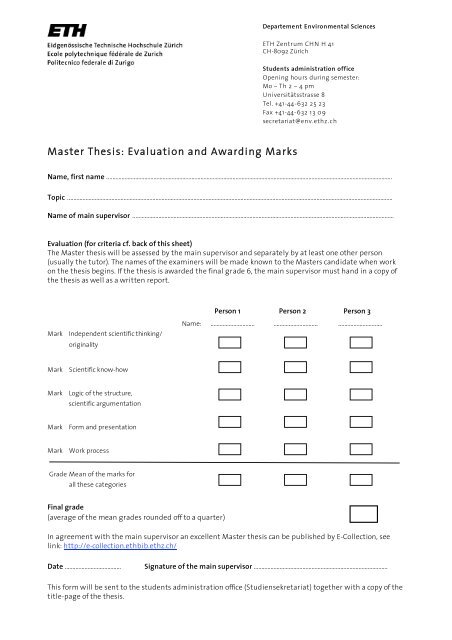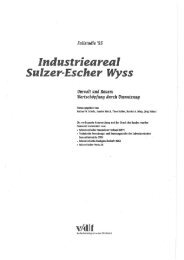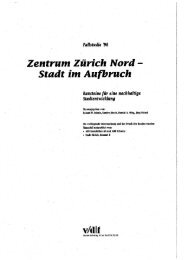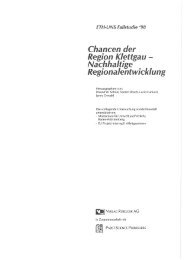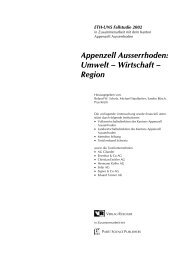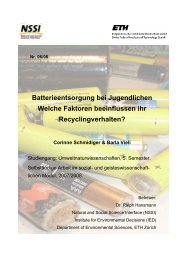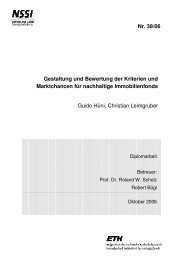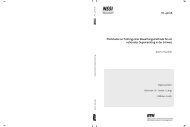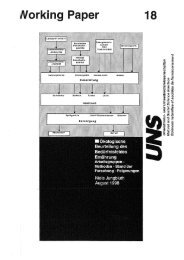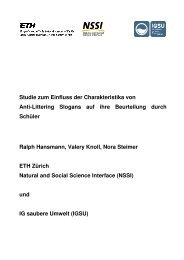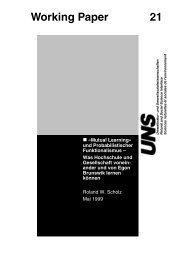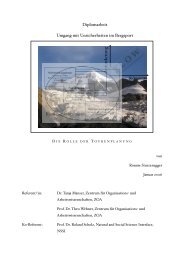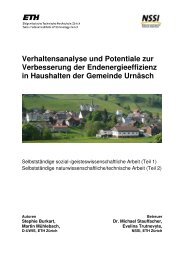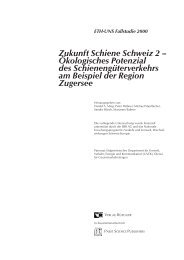Master Thesis: Evaluation and Awarding Marks
Master Thesis: Evaluation and Awarding Marks
Master Thesis: Evaluation and Awarding Marks
Create successful ePaper yourself
Turn your PDF publications into a flip-book with our unique Google optimized e-Paper software.
Departement Environmental Sciences<br />
ETH Zentrum CHN H 41<br />
CH-8092 Zürich<br />
Students administration office<br />
Opening hours during semester:<br />
Mo – Th 2 – 4 pm<br />
Universitätsstrasse 8<br />
Tel. +41-44-632 25 23<br />
Fax +41-44-632 13 09<br />
secretariat@env.ethz.ch<br />
<strong>Master</strong> <strong>Thesis</strong>: <strong>Evaluation</strong> <strong>and</strong> <strong>Awarding</strong> <strong>Marks</strong><br />
Name, first name ............................................................................................................................................................................................<br />
Topic ......................................................................................................................................................................................................................<br />
Name of main supervisor ............................................................................................................................................................................<br />
<strong>Evaluation</strong> (for criteria cf. back of this sheet)<br />
The <strong>Master</strong> thesis will be assessed by the main supervisor <strong>and</strong> separately by at least one other person<br />
(usually the tutor). The names of the examiners will be made known to the <strong>Master</strong>s c<strong>and</strong>idate when work<br />
on the thesis begins. If the thesis is awarded the final grade 6, the main supervisor must h<strong>and</strong> in a copy of<br />
the thesis as well as a written report.<br />
Mark<br />
Independent scientific thinking/<br />
originality<br />
Person 1 Person 2 Person 3<br />
Name: ............................. ............................. .............................<br />
Mark<br />
Scientific know-how<br />
Mark<br />
Logic of the structure,<br />
scientific argumentation<br />
Mark<br />
Form <strong>and</strong> presentation<br />
Mark<br />
Work process<br />
Grade Mean of the marks for<br />
all these categories<br />
Final grade<br />
(average of the mean grades rounded off to a quarter)<br />
In agreement with the main supervisor an excellent <strong>Master</strong> thesis can be published by E-Collection, see<br />
link: http://e-collection.ethbib.ethz.ch/<br />
Date ..................................... Signature of the main supervisor ........................................................................................<br />
This form will be sent to the students administration office (Studiensekretariat) together with a copy of the<br />
title-page of the thesis.
<strong>Master</strong> <strong>Thesis</strong>: Guidelines for <strong>Evaluation</strong> <strong>and</strong> <strong>Awarding</strong> <strong>Marks</strong><br />
Each <strong>Master</strong> thesis will be assessed by at least two persons (cf. evaluation on front page). The examiners will<br />
evaluate the <strong>Master</strong> thesis in accordance with the following criteria <strong>and</strong> guidelines. The final grade will be<br />
awarded after a discussion between the examiners.<br />
Crit eria<br />
The following questions pertaining to the individual criteria are not final <strong>and</strong> can vary in importance<br />
depending on the type of thesis.<br />
1. Independent scientific thinking /originality<br />
• Does the c<strong>and</strong>idate use <strong>and</strong> develop original ideas?<br />
• Are known ideas interwoven in a new way?<br />
• Are the core findings presented in clear statements?<br />
• Does the thesis incorporate critical appraisal?<br />
• Are the possibilities <strong>and</strong> limitations of the applied method discussed?<br />
2. Scientific know-how<br />
• Does the c<strong>and</strong>idate show sufficient familiarity with current knowledge (literature, experiments)?<br />
• Is reference made to gaps in knowledge, based on an analysis of literature?<br />
• Are the methods <strong>and</strong> techniques used properly described?<br />
• Are the methods adopted appropriate to the subject matter?<br />
• Has the research (field work, collecting data, experiments, models, etc.) been carried out carefully <strong>and</strong><br />
adequately?<br />
• Have the results been sufficiently tested by statistical analyses?<br />
3. Logic of the structure, scientific argumentation<br />
• Is the exposition of the topic clear, are the aims logically stated?<br />
• Does the thesis include clearly formulated hypotheses?<br />
• Does the structure of the thesis show a logical approach to the topic?<br />
• Are the results of the research <strong>and</strong> conclusions clearly <strong>and</strong> logically presented?<br />
• Have the central questions been answered?<br />
• Is a comparison made between the results <strong>and</strong> published data? Are the results placed in a broader<br />
context?<br />
• Are generalisations supported by facts?<br />
• Are the facts clearly distinguishable from hypotheses <strong>and</strong> suppositions?<br />
• Are issues mentioned that have not been dealt with?<br />
• Are proposals made for subsequent research projects?<br />
4. Form <strong>and</strong> presentation<br />
• Have the formal requirements for diagrams, tables, literary sources etc. been met?<br />
• Is there a comprehensive, informative summary?<br />
• Is the text scientifically correct, clearly underst<strong>and</strong>able <strong>and</strong> in a grammatically sound language?<br />
• Is the layout attractive for readers?<br />
5. Work process<br />
• Does the c<strong>and</strong>idate display discernible keenness to tackle the task?<br />
• Has the c<strong>and</strong>idate acquired appropriate knowledge?<br />
• Has the research been carried out independently?<br />
• Has critical appraisal been successfully incorporated?<br />
Aw arding Mar ks<br />
<strong>Marks</strong> or grades will be awarded on the following principles:<br />
- excellent, far above average, among the best 10% (grade 6)<br />
- very good, above average, only minor flaws (5.5)<br />
- good, well within average, certain flaws (5)<br />
- satisfactory, below average, several flaws (4.5)<br />
- barely satisfactory, below average, obvious flaws (4)<br />
- unsatisfactory, well below average, serious flaws (3)<br />
The c<strong>and</strong>idate is entitled to a discussion with the examiners or to a written report explaining the awarded<br />
marks.<br />
D-UWIS Guidelines for <strong>Evaluation</strong> <strong>and</strong> <strong>Awarding</strong> <strong>Marks</strong>, July 2007


